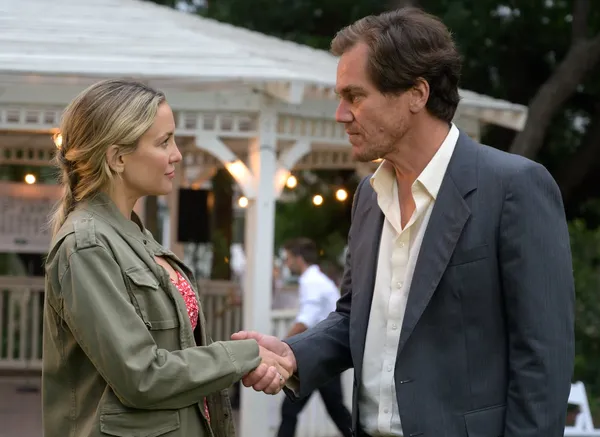 |
| Simone Cleary (Kate Hudson) greets Shriver (Michael Shannon) in Michael Maren’s whimsical A Little White Lie |
Michael Maren’s whimsical A Little White Lie (adapted from Chris Belden’s book Shriver) stars Michael Shannon (also a producer), Kate Hudson (executive producer), Don Johnson, and M Emmet Walsh with Kate Linder, Romy Byrne, Mark Boone Junior, Da'Vine Joy Randolph, Jimmi Simpson, Wendie Malick, and Zach Braff.
Honoré de Balzac, Jerzy Kosinski and Hal Ashby’s Being There, starring Peter Sellers (shown to Olivia Colman by Toby Jones in Sam Mendes’s Empire Of Light), The Landlord, Harold And Maude, Linda Lavin and Harris Yulin in A Short History Of Decay, Max Frisch’s I’m Not Stiller and Call Me Gantenbein, John Barth’s Giles Goat-Boy, James Joyce’s Finnegan’s Wake and Ulysses, Marcel Proust’s Remembrance Of Lost Time, Robert Musil’s The Man Without Qualities, Charlotte Perkins Gilman’s The Yellow Wallpaper, Jeremias Gotthelf’s The Black Spider all came up in our discussion on A Little White Lie.
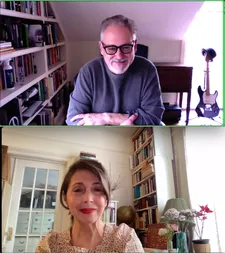 |
| Michael Maren with Anne-Katrin Titze: “Hal Ashby is on my Mount Rushmore of directors.” |
Small-town Acheron University is struggling with its literary festival. No prominent authors are willing to show up. Gone are the days when John Updike or Philip Roth were in the mix. Until English professor and Truth, Fiction and Alternative Facts literary festival program administrator, Simone Cleary (Kate Hudson), takes matters into her own hands by writing to everyone in America sharing the name of recluse writer C.R. Shriver, who disappeared after his novel Goat Time was a big literary hit and bestseller.
One of the Shrivers reached, played by Michael Shannon, works as a janitor and his friend Lenny (Mark Boone Junior) decides to help write his acceptance response, because the letter mentions a prize being given, which he imagines to be a car. Shriver decides to attend and what starts out as one impostor story turns out to be something quite different.
Teresa (Romy Byrne) from the English Department is given the task to assist the prominent guest and to accompany him with a manila envelope filled with coins from the vending machines to pay for things when needed - one of many instances in this film that show the shamelessness of this presumably enlightened environment. College novels often play awkwardly on screen.
A Little White Lie embraces the awkwardness and exaggerations and juggles the many ways the performative aspects of professions can fog the mind. Faculty member T Wasserman (Don Johnson) rides a horse across campus and a benefactor collects authors as though she were a lepidopterist. All the while, Shriver composes the beginnings of an intriguing tale inspired by the stain that suddenly appeared and expands on his bedroom ceiling …
From Northwestern Connecticut, Michael Maren joined me on Zoom for an in-depth conversation on A Little White Lie.
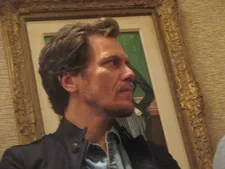 |
| Michael Maren on Michael Shannon: “I think he’s one of those actors who doesn’t really revel in his own fame and is just trying to live his regular life.” Photo: Anne-Katrin Titze |
Anne-Katrin Titze: Let’s talk about A Little White Lie! Truth, Fiction and Alternative Facts is the title of the literary festival in your film. Is that what captured your imagination, what interested you?
Michael Maren: No, I mean, Truth, Fiction and Alternative Facts was just a wry political comment, although it’s not a political film in that way. I come from a political journalism background, so I can’t stop myself. But the idea that the truth about Shriver and his identity is up in the air. There are people who watch that film who still don’t know if he’s actually the writer at the end - which I find interesting. Two things interested me: One is in general the human comedy.
I’m a huge Balzac fan and I read all of those books. I just got back from a writers’ festival in Savannah, Georgia that was wonderful. But everything that happened in the movie was happening live in front of me there. People coming up with manuscripts and that sort of thing.
AKT: It feels very real, yes. You capture the feel of those festivals well.
MM: Two things really caught my imagination. One was the idea of impostor syndrome. And I think that’s why a number of the actors responded to the script, especially Michael Shannon. The idea that suddenly you find yourself somewhere and the thought - how did I get here? Is this really me? And it becomes this out-of-body experience. And that’s what captured me originally about the novel.
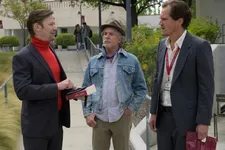 |
| Detective Karpas (Jimmi Simpson) questions T Wasserman (Don Johnson) and Shriver (Michael Shannon) |
I hadn’t heard of the novel before I walked into a bookstore in Lennox, Massachusetts and the author of the novel, Chris Belden, was reading from it. He read more or less the scene that takes place in the airplane in the movie. It was based on his experience having published a novel and being invited to those festivals thinking this is not me, I didn’t do this.
I think Michael Shannon responded to that in terms of, like, fame and all of that. I think he’s one of those actors who doesn’t really revel in his own fame and is just trying to live his regular life. That part of him is separated, it’s outside. I don’t hang around with a lot of actors, but Michael has that divide in his life.
AKT: I spoke with him in the context of [Jeff Nichols’] Midnight Special, which I loved. It was great to talk to him. You can sense that he chooses his roles wisely. Here in this part of somebody whose identity isn’t very clear, it made me think of a lot of Max Frisch’s work. It made me think of I’m not Stiller, or Call me Gantenbein. I don’t now how much these literary figures were entering here besides Chris Belden’s novel, which I haven’t read.
MM: It was Chris Belden’s novel and the obvious thing that comes to mind is Hal Ashby’s Being There, based on Jerzy Kosinski’s novel [Being There]. The idea that you have this character who is the product of what other people have put on him. So Shriver can walk into this conference and essentially deny that that he’s Shriver but everybody thinks oh, you’re just being wry. That’s also another part that interested me about it, the idea that to a certain extent we can’t know how somebody else sees us. But that is us to the outside world.
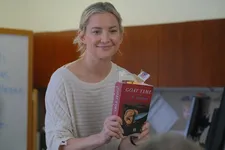 |
| Kate Hudson holds up CR Shriver’s Goat Time book |
When I directed my first film [A Short History of Decay], I remember standing with actors, Linda Lavin and Harris Yulin, and I’m telling them what to do. And I remember thinking - how did this happen? I mean, I worked really hard to make it happen, but when it does happen there’s a way where you kind of divorce yourself from it and you become a different self. That part interested me, the human and the artist, that separation.
But also the human comedy, the posturing. Everybody else in the film wants to be Shriver in their own way, Don Johnson’s character [T Wasserman] and Teresa [Romy Byrne], the young teaching assistant there. That constant striving that people have, I found something comic about it. I had a really good time creating the writer’s festival.
AKT: With Joan Didion tote bags!
MM: Exactly! You know, I made sure, that was in a crowd of people and I went to the DP [Nancy Schreiber] and said: “You got to get a shot of that going by!” There was a scene that got cut out of the film with Delta on the plane, where she lists all of those other festivals she goes to all over the world. I found that when I was in Savannah this weekend and there’s people who know all these other festivals. There’s the Hay Festival in Wales, which I’ve been to a couple of times, and there’s one in Rio and festivals all over the States.
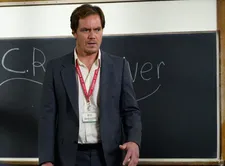 |
| Shriver (Michael Shannon) at the Acheron Literary Festival |
It’s something for people to bring culture to a community but now it’s become very competitive, because there are so many of them. This part is not in the novel, there’s a big chunk that I wrote for the film. The idea that you had this remote college, university that couldn’t get big name writers to come anymore so the festival people stopped coming to the festival and they needed a big hit. One of the ways festivals do that is to give an award to somebody.
AKT: A car - as the fantasy goes in your film! That’s a very funny part.
MM: Yes, his kind of demented friend [Lenny], played by Mark Boone Junior, who I think is wonderful in it.
AKT: He looks like Rick Rubin a little.
MM: I think Mark always looks like that. He’s looked like that since he’s done the Sons of Anarchy TV show. He came to set on his motorcycle every day.
AKT: Apropos transport. There is the horse. There is also a quite terrific cat at the beginning and of course the horse walking across campus. Did you add the animals or were they in the novel?
MM: The horse is in the novel. The novel is off the charts absurd. I changed the characters’ names. Simone Cleary, her name is Simone Cleverly and Don’s character was called T Whatchamacallit. Things that wouldn’t work on film. It would have been …
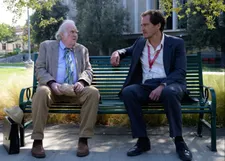 |
| Professor Arthur Baldwin (M Emmet Walsh) chats with Shriver (Michael Shannon) |
AKT: .. too much.
MM: But there is an absurdist element there. I mean the idea of divorcing yourself from your own accomplishments and then completely absolutely forgetting them. I did read a couple of articles on Impostor Syndrome and I ran the script by a psychiatrist to make sure it was within the realm of reason. But just a few steps outside of that.
AKT: You say you changed names. What about Goat Time? It’s a terrific title, I love it. It can be read as Go At Time too.
MM: Goat Time was in there. It could also be Greatest Of All Time Time. I’m a reader and a writer, I was a journalist for 20 years before doing this and there was a big book a few years ago by John Barth, called Giles Goat-Boy, which is one of the big novels that was around but I think nobody ever actually read.
AKT: Yes, like Finnegan’s Wake.
MM: There’s a lot of those, I’ve got shelves of them. For the first time I’m getting through Proust’s Remembrance of Lost Time. My wife and son and I are each reading ten pages a day and talking about it.
AKT: Does that work for you, ten pages a day? Mathieu Amalric gave me the task to finally finish The Man Without Qualities, Musil. There’s another one.
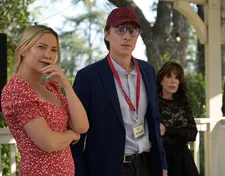 |
| Kate Hudson, Zach Braff and Kate Linder in A Little White Lie |
MM: Oh yeah.
AKT: He told me to only read ten pages a day. Some days I didn’t get to ten pages, on others I wanted to read more - it didn’t work for me. I couldn’t work with that kind of page control. It works for you?
MM: It worked because my 23-year-old son was embarrassing me because he gives out the assignments every day. So we’re going to get through at least a couple of volumes of this. And The Man Without Qualities, I have that. That’s one of the books on my shelf that I never read and the other one is James Joyce’s Ulysses, of course, which I’ve gotten about two thirds of the way through and just couldn’t. I envisioned Goat Time as one of those books. You’re not too sure if any of these people have actually ever read the book.
AKT: They have lots of post-its in it.
MM: Yeah, but people do that. The detective does that because he is looking for insight. Jimmi Simpson’s detective, I thought that Jimmi was wonderful in it. I actually wrote a piece of what I envisioned Goat Time was.
AKT: That’s interesting.
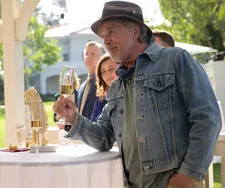 |
| T Wasserman (Don Johnson) raises a glass |
MM: The part when Shriver is reading to Simone, it was a part of the novel that I had written. In that excerpt the first-person character is watching himself from the outside. He sees somebody wearing his coat and goes to a lunch date. I wanted to give a little bit of a sense of the inside of the man who wrote the novel. I think it’s a pretty good excerpt.
AKT: The idea of the stain on the ceiling he writes about is great. It reminded me of two things, both from the 19th century. One was Charlotte Perkins Gilman’s The Yellow Wallpaper.
MM: Oh yes, sure.
AKT: The other one was The Black Spider by Jeremias Gotthelf from 1842.
MM: That one I don’t know.
AKT: A woman - I think it’s a woman, I haven’t read it since high school, but a spider is growing inside of her cheek. The stain that is growing works very well in the film.
MM: Even in what I wrote I was going for something in the domain of Kafka. Not quite Metamorphosis but the idea of obsession, the writer’s utter obsession on this stain. Again, this is all things I thought about that isn’t there. But he’s the building super, he could fix that.
AKT: Oh, yes, of course! I didn’t think of that.
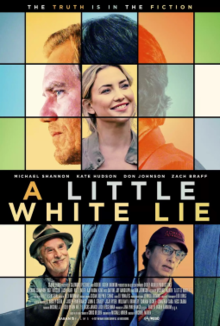 |
| A Little White Lie poster |
MM: I mean, that’s his job, right? In my mind he gets a free apartment because he’s taking care of this slum building somewhere. But instead of doing that he just fixates on it because it represents to him this tragedy of his life when his wife left him. So he just lets it grow, as ideas grow within us. Or how you allow something negative to metastasise within you. And the writing was a way to get it out. All of this stuff that was in my mind that I tried to get into the context of a comedy.
AKT: Being There you mentioned earlier and yes, I did think of that. And also a little bit of Forrest Gump. Insofar as Michael Shannon’s character not being fully there but being more there than most people are in another sense. I don’t know if that makes sense?
MM: That does make sense! Hal Ashby is on my Mount Rushmore of directors. I love Hal Ashby and the way he handles material. He’s one of the directors I’ve sort of studied. I thought about Being There and about The Landlord and obviously Harold And Maude. The directing is sort of non-intrusive but it very subtly supports the underlying grid of the story. Being There was very much in my mind. It didn’t occur to me until I actually started thinking about how to direct the film.
AKT: Thank you very much for this conversation!
MM: Thank you, it was a great conversation! I appreciate it.
A Little White Lie is in cinemas in the US.





















